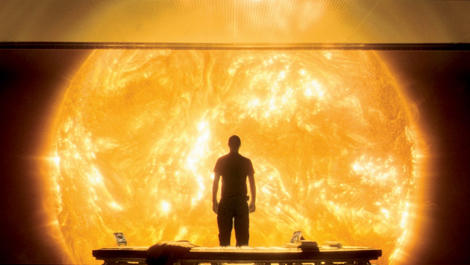Is It Just Me... Or Is Sunshine The Best Sci-fi Flick Of The Century?
Better than Avatar, Prometheus and Moon?

Sounds like a stretch, right? Then consider the following:
One, the competition is either the gorgeous-but-dim Avatar and Prometheus , or the impressive (given the budget) Moon .
Two, its influence can be felt everywhere, from that Carling advert which equates heaven with a rubbish nightclub to John Murphy’s stirring score adorning every other trailer.
Oh yeah, and let’s not forget reason three: it’s absolutely freaking awesome.
Danny Boyle’s hyper-visceral direction means you feel each atmosphere change – the burning sun, the freezing coolant, the choking space dust – as if you were aboard the Icarus 2.
Alex Garland’s script is characteristically sharp and brutal, making plot points of the crew’s gnawing boredom.
How often do you watch a group of film characters die and only remember their deaths? Here you remember their names, (Capa, Mace, Kaneda), their roles (physicist, engineer, captain) – even the things they love. “The waves make me feel peaceful,” says the bellicose Mace (Chris Evans) as he takes some time out in the Earth Room simulator.
The inclusion of an Oxygen Garden (greenhouse) so the ship can generate its own air supply is another genius detail: Nasa should take note.
The filmmakers also deserve credit for using an international cast of (excellent) actors from as far afield as Malaysia (Michelle Yeoh) and Japan (Hiroyuki Sanada), accents and all.
It’s the future, the fate of the entire world is at stake, yet every other space flick would just feature a bunch of WASP-y Americans with an English villain.
Indeed, the chief criticism here is that when the space-crazed – and English – Captain Pinbacker (Mark Strong) turns up, the film turns, briefly and shockingly, into a psycho thriller, and loses its way.
It’s a fair point, but most sci-fi flicks are only this, nothing more.
Crucially, Sunshine has the looks to match its brains, something nobody could claim for, say, Avatar , which remains one Unobtanium molecule short of a full set.
The still-unsurpassed CGI is so gorgeous both the crew, and the film, are stopped in their tracks by Mercury pirouetting impossibly round the sun.
“In the face of this,” says Pinbacker, “we are dust, nothing more.” It’s hard to disagree.
And herein lies the key. Moon can be boiled down to: “Don’t go into space with Spacey.” Avatar : “Be excellent to one another.” Prometheus has two: “Don’t fight aliens with geologists,” and “Don’t let things crawl up you.”
But this is a film that’s actually about something: the nature of sacrifice, the human race’s capacity to destroy itself, the quasi-religious powers of the sun.
It’s an entrancing light show about the entrancing possibilities of light, in genre that’s still stuck in the dark ages. Or is it just me?
Sign up for the Total Film Newsletter
Bringing all the latest movie news, features, and reviews to your inbox
Matt Glasby is a freelance film and TV journalist. You can find his work on Total Film - in print and online - as well as at publications like the Radio Times, Channel 4, DVD REview, Flicks, GQ, Hotdog, Little White Lies, and SFX, among others. He is also the author of several novels, including The Book of Horror: The Anatomy of Fear in Film and Britpop Cinema: From Trainspotting To This Is England.


